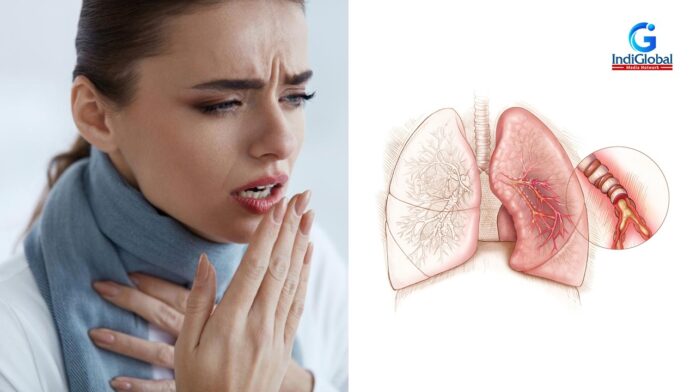Kaniza Garari
Dr Sachin D, Consultant – Interventional Pulmonology, Critical Care and Sleep Medicine, Manipal Hospital, Bengaluru talks to IndiGlobal Media Network about respiratory health and the impact of Covid 19 on asthma disease in India.
Q Due to Covid 19 pandemic, how have the last two years been for asthmatic patients? Were they protected due to the physical distancing and masking in society?
To some extent, Covid 19 has helped to prevent attacks in asthmatics due to the universal use of masks, hygiene, and avoidance of outdoor allergens and pollution. However, due to the less frequent hospital visits, asthma patients needed guided home management strategies with the help of video consultations with doctors from home. We even had international asthma patients who used to be in touch with us through video consults, and have been successfully able to manage their symptoms at home with proper guidance from the doctors. There were several severe asthma patients whom we managed to control their symptoms with home-based nebulization and medications without the need for frequent hospitalizations and emergency visits.
Q With the respiratory viruses also attacking India during the months of summer which was usually considered safe for asthma patients how must they keep themselves protected 24 by 7?
Summer is a season that normally is expected to be good for most asthmatics, however with the change of season also comes a lot of respiratory viral infections which can trigger asthma attacks requiring a change in treatment. Patients with asthma should continue regularly their treatment during this season and use full precautions like wearing face masks while outdoors, hand hygiene, social distancing, and cough etiquette. They should get themselves vaccinated annually with the Influenza vaccine to prevent recurrent flu attacks. They are also advised to maintain distance from people having a common cold and avoid cold drinks, especially during summer.
Q Is there a rise in new asthma cases post-pandemic? Was the disease which was an underlying event in many come to the fore in the last two years?
We are seeing a lot of asthma cases being diagnosed post-Covid pandemic. This could be due to several factors:
- First and foremost, Covid 19 has taught everyone to monitor their respiratory health and many patients post-Covid who undergo pulmonary function test to check their lung capacity gets diagnosed with asthma which might have been quiescent with mild symptoms.
- Early diagnosis and initiation of treatment is observed in this category of patients.
- There is another category who had mild symptoms but avoided hospital visits, and now post-pandemic they are coming and getting diagnosed with asthma. The pandemic caused a lot of trouble for these groups of patients.

Q Which age group is this being seen the most in?
There are a lot of pediatric patients who are also coming with asthma and bronchiolitis symptoms following the Covid 19 pandemic.
- Young adults who had mild symptoms during Covid 19 infection and recovered from it but had persistent dry cough and wheezing following recovery had the highest risk to have asthma and thus need to be evaluated.
- Asthma patients who recovered from Covid 19 infection had post-recovery reduced lung capacity which takes months to recover.
Q Respiratory health and breathing exercises have come to the limelight due to Covid 19 and there are more and more people who are opting for it – does this mean that this will help us control asthma which is acquired due to pollution and dust levels? What is the status especially in cities?
Respiratory health and the importance of hygiene and breathing exercises have come into the limelight after the Covid 19 pandemic. People who were unaware of them are practicing these as a routine even in the absence of Covid 19. This has definitely helped to curtail not only asthma attacks but also other respiratory infectious conditions including tuberculosis. Masking, social distancing, hand hygiene, and avoidance of overcrowding have definitely led to reduced exposure to triggers like pollens, dust, smoke, pollution, and viral particles. These factors help asthma patients to reduce attacks and thereby decrease the frequency of their emergency visits.

Q What is the role of genetics and family history of the disease in terms of respiratory diseases?
Asthma has a strong genetic background and hence those who have a family history of asthma and allergies should be more cautious and monitor their respiratory health regularly to detect allergic symptoms and asthma in its early stages. If they have symptoms of frequent allergy or recurrent cough, cold, and breathing trouble with wheezing, they are advised to consult their doctor for proper evaluation and get a pulmonary function test to rule out asthma. Children of asthmatic parents should be regularly screened for symptoms and take proper precautions so that they do not progress to asthma.
Q On World Asthma Day what is the way forward for India and how must India tackle this disease in their population?
On World Asthma Day, India should bridge the gaps in asthma diagnosis and care. This is a preventable and treatable condition with significant advanced diagnostics and therapies.
- Pulmonary function tests
- Allergy
- Immunological tests
These are available for early detection of this condition.
In treatment:
- Inhalers do remain the mainstay of treatment.
- Advanced treatments are monoclonal antibody therapies, immunotherapy, and bronchial thermoplasty are for a few select asthma patients.








